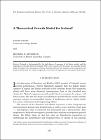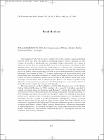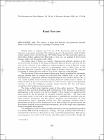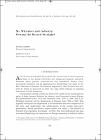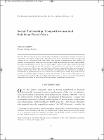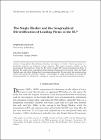Browsing Economic and Social Review by Author "Barry, Frank"
Now showing items 1-17 of 17
-
A theoretical growth model for Ireland
Barry, Frank; Devereux, Michael B. (Economic & Social StudiesDublin, 2006)Ireland is distinguished by the high degree of openness of its labour market and the importance of foreign direct investment (FDI) in the economy. We develop a neo-classical growth model to explore the consequence of these ... -
Aggregate job creation, job destruction and job turnover in the Irish manufacturing sector
Strobl, Eric A.; Walsh, Patrick Paul; Barry, Frank (Economic & Social StudiesDublin, 1998)Using an annual employment survey data set we construct aggregate job flow rates for the Irish manufacturing sector for the period 1974 to 1994. We report the existence of simultaneous job creation and job destruction, ... -
Book review: Interrogating Irish policies / by William Kingston. Dublin: Dublin University Press, 2007.
Barry, Frank; Kingston, William (Economic & Social StudiesDublin, 2008) -
Book review: The politics of high-tech growth: developmental network states in the global economy / by Sean O Riain. Cambridge University Press. 2004.
Barry, Frank; O Riain, Sean (Economic & Social StudiesDublin, 2005)?Sticky places in slippery space? is one of the best-known phrases from the literature on economic geography. The ?slippery space? is the globalised world of highly mobile capital, labour and technology. The ?sticky places? ... -
Comment on "Dangers for Ireland of an EMU without the UK: some calibration results" by Frank Barry
FitzGerald, John D.; Barry, Frank (Economic & Social StudiesDublin, 1998)In the October 1997 issue of this journal Barry set out a simple model of the Irish economy. The model was designed to quantify the possible effects on Ireland of sterling weakness, where Ireland is a member of the EMU and ... -
Crowding out effects of government spending
Barry, Frank; Devereux, Michael B. (Economic & Social StudiesDublin, 1992)This paper surveys the recent theoretical literature on the linkage between government spending and the real economy. Two broad frameworks are explored. Nee-Keynesian models deal with economies characterised by wage or ... -
"Crowding out effects of government spending": a comment
Fagan, Gabriel; Barry, Frank; Devereux, Michael B. (Economic & Social StudiesDublin, 1992)This paper presents a review of the current state of macroeconomic theory concerning the impact of Government spending on economic activity. The models presented reflect the current approach in theoretical analysis of ... -
"Dangers for Ireland of an EMU without the UK": a reply to John FitzGerald
Barry, Frank; FitzGerald, John D. (Economic & Social StudiesDublin, 1998)In his comment on my 1997 paper John FitzGerald (JFG) makes the following points: (i) While the ESRI study on EMU, henceforth ESRI (1996), found no evidence of my hypothesis of downward nominal wage rigidity, this could ... -
Dangers for Ireland of an EMU without the UK: some calibration results
Barry, Frank (Economic & Social StudiesDublin, 1997)This paper presents a small-open-economy model calibrated to Irish data. The model can be used for many purposes. It is applied here to the EMU debate. It comes close to replicating the employment effects of sterling ... -
Mr. Whitaker and industry: setting the record straight
Barry, Frank; Daly, Mary E. (Economic & Social StudiesDublin, 2011)After 16 years of unbroken Fianna Fail rule, the first four of the five general elections of the period 1948-1963 saw sitting governments unseated. Economic policy pivoted: protectionism was abandoned; foreign direct ... -
Multinationals and indigenous employment: an "Irish disease"?
Barry, Frank; Hannan, Aoife (Economic & Social StudiesDublin, 1995)In trade studies, Ireland emerges as having a revealed comparative disadvantage in labour-intensive industries. Can the country's unusual industrial structure contribute to our understanding of its high unemployment? The ... -
On the causes of Ireland's unemployment
Barry, Frank; Bradley, John (Economic & Social StudiesDublin, 1991)This paper attempts to account for the rise in Irish unemployment between 1970 and 1987. To this end a fully articulated medium-term model of the economy is employed, in contrast to the four equation model of the labour ... -
Payroll taxes, capital grants and Irish unemployment: a comment
Ruane, Frances; Barry, Frank (Economic & Social StudiesDublin, 1989)In this paper Frank Barry examines the issue of the appropriateness of capital versus labour subsidies in the Irish economy, in the context of three different models, namely a neo-classical small-open-economy model, a ... -
Payroll taxes: capital grants and Irish unemployment
Barry, Frank (Economic & Social StudiesDublin, 1989)A recent OECD study concluded that no other member country had a tax/subsidy system as biased against the use of labour as the Irish. This view of the flawed nature of the Irish system has, however, been disputed by many ... -
Politics and fiscal policy under Lemass: a theoretical appraisal
Barry, Frank (Economic & Social StudiesDublin, 2009)Lemass rejected Whitaker?s recommendations that direct taxes be reduced and public investment shifted from social to productive areas. This was arguably done for political reasons and because Lemass believed that it might ... -
Social partnership, competitiveness and exit from fiscal crisis
Barry, Frank (Economic & Social StudiesDublin, 2009)The contribution of social partnership to Ireland?s economic boom remains the subject of controversy. This paper analyses at a theoretical level how a multi-period deal on wages and taxation of the type struck in the late ... -
The single market and the geographical diversification of leading firms in the EU
Pavelin, Stephen; Barry, Frank (Economic & Social StudiesDublin, 2005)Geographical diversification describes the degree to which a firm?s operations in a particular industry are dispersed across countries. This paper presents evidence on the geographical diversification within the EU of the ...




